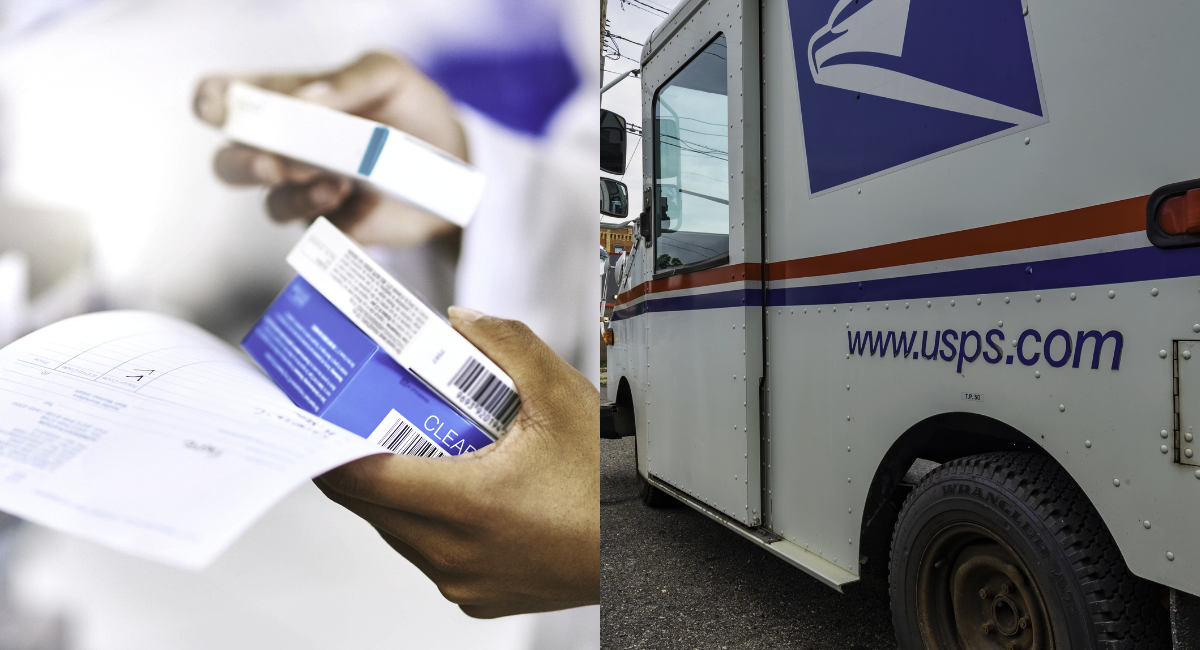One of the jobs of the United States Postal Service (USPS) is to “prevent the flow of illicit drugs and contraband through the mail stream” and to “eliminate the mailing of opioids and other illicit drugs and it works closely with other law enforcement agencies, including U.S. Customs and Border Protection, to share intelligence, coordinate cases and conduct joint enforcement operations” according to its website (emphasis added).
Since that website also clearly states, “The Postal Inspection Service enforces over 200 federal statutes related to crimes that involve the postal system, its employees, and its customers” (emphasis added), then it stands to reason that the USPS should enforce the Federal Comstock Act — which is also a federal statute. A report published by Americans United for Life (AUL) and Live Action explains, “A key focus of the Act was a national prohibition on the sale and shipment of abortion drugs and devices through the U.S. Mail.”
A separate AUL report explained Comstock further, noting, “Two statutes—18 U.S.C. §§ 1461–1462—restrict mailing or shipping abortifacient matter…. Section 1461 contains a mail-order abortion rule that restricts mailing abortifacient matter through the United States Postal Service (“USPS”). 18 U.S.C. § 1462… contains a mail-order abortion rule that prohibits the shipment of abortifacient matter through express companies, common carriers, or interactive computer services. Although 18 U.S.C. §§ 1461–62 originated in nineteenth century statutes, Congress regularly has amended and reaffirmed the laws throughout their statutory history. Congress also has bolstered the laws through U.S.C. § 552, which requires federal officers to comply with the prohibition on mailing abortifacients” (emphasis added).
AT A GLANCE:
- The Comstock Act (federal law) already restricts the shipment or mailing of “abortifacient matter through express companies, common carriers, or interactive computer services.”
- There are indications that those in charge of enforcing the law at USPS may be choosing to ignore it out of partisanship.
- Illegal abortion pill syndicates are flooding the U.S. with abortion drugs, as domestic groups advise women to lie about their true locations in order to get the pills through the mail.
- Investigations into the shipping of abortion drugs are possible — and a drug-sniffing dog proved it.
- Sometimes it takes years of complaints before investigations are launched.
- Both the U.S. Postal Service as well as other governmental authorities can be contacted regarding the problem of shipping abortion pills through the mail or other common carriers in violation of federal law.
The abortion pill (Mifeprex or mifepristone 200 mg) was approved by the Food and Drug Administration (FDA) for the “termination of pregnancy” in 2000, while Roe v. Wade was still the law of the land, as decided by the U.S. Supreme Court in 1973. But in June of 2022, Roe was overturned by the United States Supreme Court in the Dobbs v. Jackson Women’s Health Organization decision.
This set the stage for enforcing the federal law, known as The Comstock Act (18 U.S.C. § 1461), a law rarely used in modern times because of Roe. Comstock prohibits the mailing of “any article, instrument, substance, drug, medicine, or thing [that] may, or can, be used or applied for producing abortion[.]”
Who oversees USPS — and why does this matter?
USPS is “an independent federal establishment, mandated to be self-financing and to serve every American community through the affordable, reliable and secure delivery of mail and packages to 169 million addresses six and often seven days a week.”
USPS is overseen by what is supposed to be a bipartisan Board of Governors. However, Influence Watch has alleged that the current USPS Board of Governors may not be as bipartisan as it should be (emphasis added):
Biden nominated [Amber] McReynolds to the board of governors as an ‘independent.’ By law, the 9-person U.S. Postal Service board of governors may only contain a maximum of 5 members from either major political party so as to prevent a supermajority. Critics have pointed out that nominating McReynolds as an ‘independent’ freed up a Democratic seat for a future appointment under the Biden administration, creating an illegal, albeit unofficial, supermajority on the board of governors.
In March of 2019, Gary R. Barksdale was appointed Chief Postal Inspector for the U.S. Postal Inspection Service (USPIS), the inspection side of USPS, and he reports to the Postmaster General. Just over a year later, in June of 2020, Louis DeJoy was appointed by USPS’ Board of Governors to be the Postmaster General. DeJoy is also a member of Elon University’s Board of Trustees, whose professor of religious studies — Rev. Rebecca Todd Peters, a member of the Planned Parenthood’s clergy advocacy board — has claimed she felt “God’s presence” during her two abortions.
In 2023, in response to an abortion pill lawsuit that sought to limit mail order abortion pills, DeJoy told the Washington Post that the Postal Service would “follow the law. Whatever we get told to do, we’re going to do. And if the law in fact gets changed, we will have to follow that law instead. It’s that simple.”
But the Federal Comstock Act is already law and there is no ambiguity there — so the question is, why hasn’t DeJoy enforced Comstock already?
Existing federal law against abortion pill trafficking isn’t being enforced
If mailing abortion drugs is already a violation of the Federal Comstock Act, then why are virtual abortion pill dispensaries and brick-and-mortar businesses like Planned Parenthood in the U.S. shipping them to minors and adults, in violation of the law?
And how can pharmacies like Walgreens and CVS openly mail the abortion pill on behalf of prescribers? In addition, now that Roe v. Wade has been overturned, why are abortion providers in multiple states openly shipping these drugs “unlawfully” into states that prohibit them or restrict telehealth dispensing?
The answer is simple: despite USPS’ claims to uphold federal law, there has been no enforcement of this particular law by U.S. Postal Inspectors or by any other federal agency.
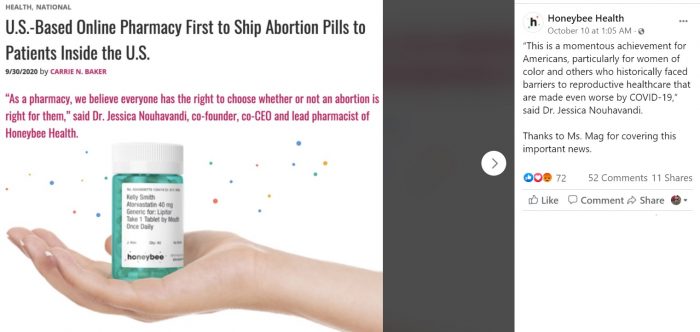
HoneyBee Health pharmacy mail order abortion pill pharmacy (Image: Facebook)
This is one reason why three states have filed suit, requesting that the Courts require enforcement of the federal Comstock Act and grant them the ability to “vindicate [their] sovereign, quasi-sovereign, and proprietary interests, including [their] interests in protecting [their] citizens.”
Live Action News has tracked the concerning proliferation of illegal abortion pill syndicates flooding across U.S. borders with deadly abortion-inducing drugs — while federal customs agents fail to crack down:
- In January of 2023, Live Action News warned how illegal abortion pill ‘shadow networks’ were eyeing homes for sale to use as fake addresses when ordering abortion drugs by mail — and how they were recruiting “helpers” to “shepherd” their illegal abortion pill drug cartel networks.
- In 2022, Live Action News warned of an abortion ‘underground’ emerging to dispense the deadly drugs. In May of 2023, we reported how these illegal abortion pill vigilante syndicates seem to have open access to mainstream journalists — including reporters at the Washington Post — who cover for their deeds.
- And we exposed Las Libres syndicate, located in Mexico, alleged to be behind efforts to smuggle abortion drugs into the U.S.
- Then in August of 2023, we documented an unregulated abortion pipeline, which was storing abortion pills on a “ping-pong table” and shipping drugs from a makeshift home office in someone’s basement.
In addition, Live Action News has previously documented how groups like ‘Plan C’ advise women how to skirt the laws of states prohibiting online sales of the abortion drug regimen by suggesting abortion pill clients lie about their true locations when contacting abortion pill providers and use the USPS’ “general delivery” system to skirt state laws.
This could end if the Comstock Act were enforced.
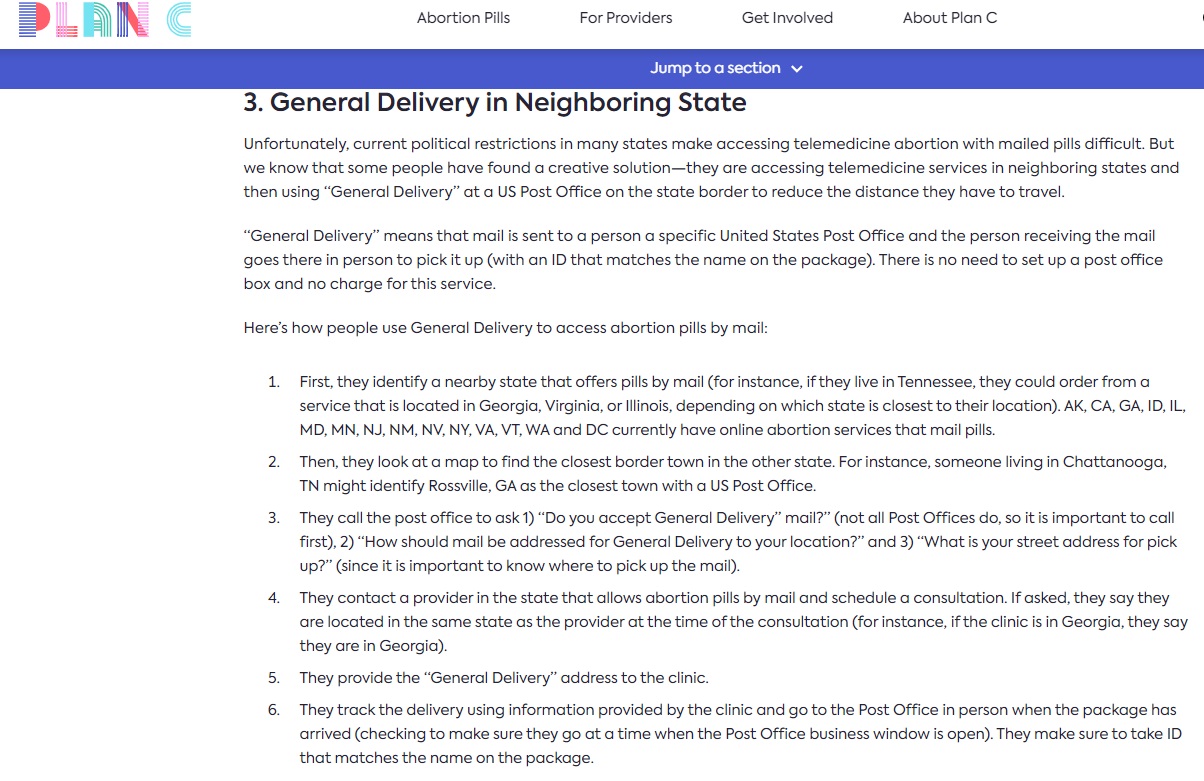
Plan C deceptive but creative ways to access abortion pills 3
Abortion pills were sniffed out in the mail once — likely due to contamination with other drugs
Live Action News previously documented at least one instance in which postal workers investigated the mailing of abortion drugs. However, it appears the investigation only took place because the abortion pills were contaminated by trace amounts of narcotics.
The 2022 postal inspection bust of an abortion pill ‘prepper’ kit took place in Jackson, Mississippi, after the kit was flagged by a drug sniffing dog.
“Prepper kits 3,5,10 (for future use),” or “Anti-Preg Kits,” are described by Medside24.com as “a small bulk pack of 3, 5 or 10 abortion kits” at a discounted price. The catch? Medside24.com’s website says the pills “ship from India and take around 3 weeks to be delivered to [the] USA.”
The Intercept reported that “The envelope contained five pills labeled ‘AntiPreg Kit.’ They were made in India, and their medical purpose is to induce abortion.” The outlet added, “The… investigation came out of a sort of collaboration between the feds’ regional offices and a local official: U.S postal workers and a city K-9 cop. Though no one in Mississippi has yet been arrested for helping carry out an abortion.”
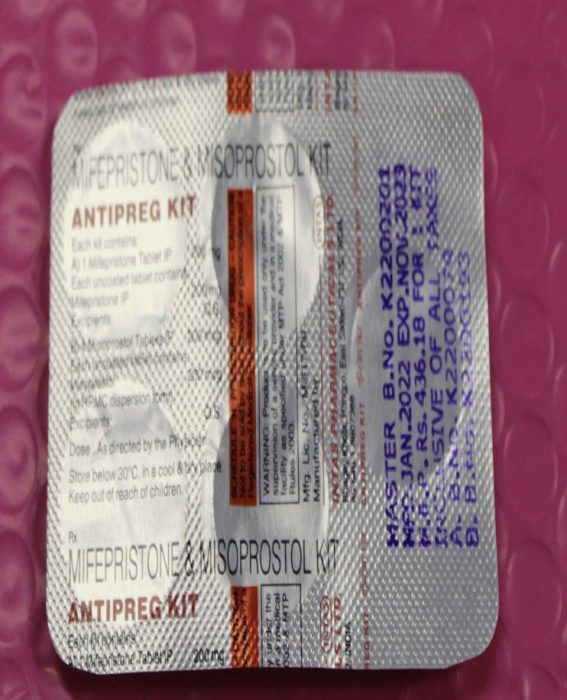
AntiPreg abortion pill prepping kit evidence uncovered in drug sting
“Why would a police dog alert on abortion pills in the first place, when they’re not narcotics?” the Intercept asked — then answered, “[a] USPIS national spokesperson speculated that the pills found in Jackson were contaminated in the manufacturing process by trace amounts of a drug such as marijuana, or perhaps someone was handling narcotics when they did the packing and left molecules behind that only canines’ super-sensitive noses can detect.”
The squeaky wheel gets the grease?
While the drug sniffing dog case did not demonstrate a Comstock Act enforcement, it indicated that investigations into mailed abortion drugs are possible.
And the possibility of investigations could increase if the American public becomes educated and begins to speak out and file complaints.
For example, in an unrelated case, the U.S. Postal Inspection Service took down one of the largest fraud schemes in U.S. history, because complaints began to mount. The case was highlighted on Mailin’ It, the USPS’ official podcast in an episode entitled “How Postal Inspectors Cracked the Largest Fraud Scheme in U.S. History.”
The episode reportedly showed “how the Postal Inspection Service took down one of the largest fraud schemes in U.S. history, which fleeced more than 1.3 million victims for more than $175 million over two decades… revealing the shocking tactics used by the scammers, from impersonating a psychic to exploiting data from mailing lists…” according to the podcast teaser.
But, astoundingly, this case was not investigated until complaints had been lodged “for years,” noted the podcast. “The complaints got to be sizable enough by around 2004 that the Postal Inspectors took notice and started to look into it….”
Practical Step #1: Contacting USPS
“Americans across the United States use the U.S. Mail daily and rely upon the Postal Service to ship numerous types of items for personal and business purposes. However, what people may not know is that certain items and substances should never enter the mail system. These materials are not only considered hazardous but are also illegal to send through the mail. Prohibited, restricted, and non-mailable items include anything containing liquid mercury, fireworks, live ammunition, strike-anywhere matches, explosive or flammable devices, and corrosive or acidic substances and materials, as well as several others,” the USPIS website states.
Given that the Comstock Act (18 U.S.C. § 1461) prohibits the mailing of “any article, instrument, substance, drug, medicine, or thing [that] may, or can, be used or applied for producing abortion[,]” technically, under this federal law, abortion pills, instruments, etc., mailed through USPS or any other common carrier would therefore be prohibited.
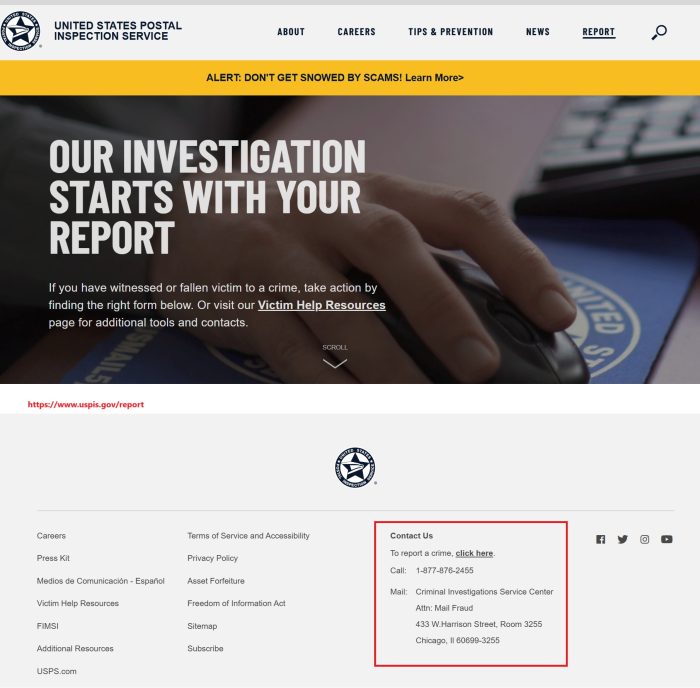
US Postal Service USPS complaints over the Comstock Act and abortion pills
However, USPS can only investigate those prohibited items sent through the U.S. Mail.
If you have firsthand knowledge that a person or business is mailing prohibited material under the Federal Comstock Act, such as drugs intended to induce an abortion (not for miscarriage or to save the life of a woman), here are some practical steps you can take to request an investigation.
1. Contact the U.S. Postal Service by phone.
The general phone number listed on the USPS website is 1-800-ASK-USPS (1-800-275-8777), but the interactive phone voice response system may not give you a prompt for filing complaints so a written complaint may be best.
2. Request an investigation by the U.S. Postal Inspection Service office (USPIS) office near you (locate one here).
3. Navigate to the U.S. Postal Inspection Service (USPIS) website under “tips” and look for “suspicious mail.”
Understand this category is generally used to report packages suspected to contact dangerous substances or explosives.
The website states that, “If you suspect you have received a suspicious package, isolate the item, maintain a safe distance from the item, wash your hands, and immediately call Postal Inspectors at 1-877-876-2455…”
4. Send a written complaint.
Given that the abortion pill is prohibited from being mailed under the Federal Comstock Act, a written complaint could also be addressed to:
Criminal Investigations Service Center
Attn: Mail Fraud
433 W. Harrison Street, Room 3255
Chicago, IL 60699-3255
Practical Step #2: Contacting authorities about abortion pills sent via other common carriers
1. Contact the Office of the U.S. Attorney General (AG Pam Bondi) by sending written letters or complaints to:
U.S. Department of Justice
950 Pennsylvania Avenue, NW
Washington, DC 20530-0001
… as well as the U.S. Attorney in your location at the Office of the United States Attorneys website.
2. Write to your State Attorney General (AG) by locating that specific office here.
If your state prohibits the mailing of abortion pills, filing complaints with your state or county law enforcement agency could render an investigation even if the abortion pills were shipped via USPS, as there are often joint task force operations between local law enforcement and the U.S. Postal Inspection Service.
3. Send a copy of your complaint to your U.S. Representatives, asking them to put pressure on federal agencies to enforce the Comstock Act.
IMPORTANT NOTE: Any citizen who orders abortion pills or receives or sends abortion-inducing drugs through the mail to accumulate evidence of alleged illegal activity risks violating the Federal Comstock Act. In addition, suggestions in this article for filing complaints are not intended to be substituted for legal advice, so be sure to consult an attorney for any questions or concerns you might have on this matter.

